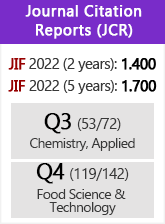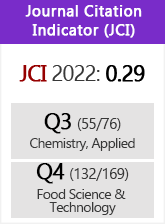Comparison studies of propylene oxide addition to phenyloctadecanol and phenyloctadecanoic acid and the surface activity studies of their sulphated products
DOI:
https://doi.org/10.3989/gya.2001.v52.i5.369Keywords:
Hydroxypropylation, Phenyloctadecanol, Phenyloctadecanoic acid, Sulphation, Surface activityAbstract
Phenyloctadecanol and phenyloctadecanoic acid were produced via Lewis acid catalyzed reaction of benzene and oleyl alcohol (60 ºC) or oleic acid at (80 ºC) respectively. A comparison study was achieved for the addition of propylene oxide to both substrates in the presence of base (KOH) and Lewis acid (SbCl5) catalysts. It was found that, the hydroxypropylation of both substrates at low temperature via Lewis acid catalyst is more preferable than via the base catalyst. The surface activity of the sulphated products was determined. The results revealed that, the samples produced from alcohol (phenyloctadecanol) show a better surface activity than that from acid (phenyloctadecanoic acid). On the other hand the samples produced from both substrates using Lewis acid catalyst have a better surface activity than that produced with the base catalyst.
Downloads
Download data is not yet available.
Downloads
Published
2001-10-30
How to Cite
1.
Ahmed MH. Comparison studies of propylene oxide addition to phenyloctadecanol and phenyloctadecanoic acid and the surface activity studies of their sulphated products. Grasas aceites [Internet]. 2001Oct.30 [cited 2024Jul.22];52(5):285-90. Available from: https://grasasyaceites.revistas.csic.es/index.php/grasasyaceites/article/view/369
Issue
Section
Research
License
Copyright (c) 2001 Consejo Superior de Investigaciones Científicas (CSIC)

This work is licensed under a Creative Commons Attribution 4.0 International License.
© CSIC. Manuscripts published in both the printed and online versions of this Journal are the property of Consejo Superior de Investigaciones Científicas, and quoting this source is a requirement for any partial or full reproduction.All contents of this electronic edition, except where otherwise noted, are distributed under a “Creative Commons Attribution 4.0 International” (CC BY 4.0) License. You may read here the basic information and the legal text of the license. The indication of the CC BY 4.0 License must be expressly stated in this way when necessary.
Self-archiving in repositories, personal webpages or similar, of any version other than the published by the Editor, is not allowed.
















